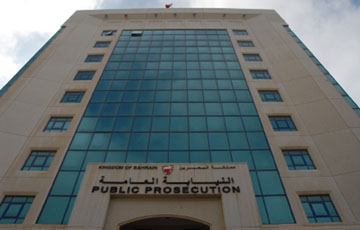ID :
368200
Thu, 05/21/2015 - 12:44
Auther :
Shortlink :
http://m.oananews.org//node/368200
The shortlink copeid
Public Prosecution: defendant had all legal guarantees

Manama, May.21 (BNA) The Public Prosecution today confirmed that the trial of the secretary general of one of Bahrain’s political societies was carried out in full accordance with the Code of Criminal Procedure, which guarantees all defendants legal guarantees to ensure a fair trial.
The Public Prosecution launched an inquiry following notification of criminal offences that required investigation. The Public Prosecution followed all legal procedures; the defendant was informed of the charges leveled against him and allowed to seek the legal assistance of a lawyer.
Following the conclusion of the Public Prosecution’s exhaustive investigations, the defendant’s case was referred to the relevant criminal court for consideration.
The court ensured that all legal requirements were followed, including the testimony of seven defence witnesses and one prosecution witness.
The court also ensured that defence lawyers were able to submit relevant documents and outline their defence pleadings on five consecutive sessions, separated by month long intervals.
The Public Prosecution believes that the defence lawyers should have waited for the court to announce its verdict before issuing public statements.
In a statement today, the Public Prosecution issued the following statement to address the false claims made via the media:
Claims that the defence teams have not completed the presentation of their evidence are entirely refuted. The court decided during its session of 22 April, in the presence of defence lawyers, to adjourn the case until 20 May to hear prosecution and defence final pleadings.
Article 1/225 of the Code of Criminal Procedure stipulates that the pleadings should come after hearing the prosecution and defence witnesses and that the defendant should be the last to speak before the announcement of the verdict.
In compliance with the above-mentioned procedures, the prosecution and defence delivered their pleadings and closing arguments today. The defence lawyers did not signal that they had different pleadings to make, nor did they ask to make new pleadings, demanding only to hear the defendant.
The court duly heard from the defendant who failed to address the subject of the case repeatedly, which prompted the court to interject, in line with Article 2/225 of the Code of Criminal Procedure.
The law does not require the court to adjourn the case for the defence team to study the pleadings of the Public Prosecution as these did not represent new evidence or information.
Concerning allegations of preventing lawyers from visiting the defendant for an adequate period of time, the register of visits to the defendant while in custody show that the number of visits received amounted to 36, with an average of more than four hours for each. The defendant’s lawyers visited him on 8 separate occasions. During the majority of visits, the defendant’s lawyers did not use the full amount of time allocated to them. The defendant was also able to make 185 telephone calls throughout his detention.
Regarding the prosecution witness and not informing the defence in advance of the investigation session, it should be noted that the Public Prosecution is not legally obliged to summon the defence to attend investigative procedures. It has the legal right to decide on this matter depending on the requirements of the investigation, in accordance with Article 84 of the Code of Criminal Procedure.
Moreover, the investigation carried out by the Public Prosecution is only preliminary, as the final investigation is carried out by the court. The court has conducted its questioning of the witness in thepresence of the defence panel and the Public Prosecution ensured the lawyer's attendance at all investigative sessions, enabling the lawyer to meet the defendant alone for an adequate amount of time. Furthermore, the defendant was given breaks during questioning at his request or for prayers, and his lawyer was able to submit all relevant defence documents during the investigative sessions.
In regards to witnesses’ testimony, when listening to testimonies the defence has the right to address questions for the witness to the court, which shall then decide on whether the questions should be posed.
The defence also accused the prosecution witness of committing perjury while testifying before the court. The court heard the witness’s testimony during the session of 25 March, however thedefence did not notify the court of this accusation until 19 May, the day before the last session.
In response to the accusation that the Public Prosecution used selective sections of the defendant’s speech to change its original meaning, it should be noted that the Public Prosecution only aims to address extracts of the speech which constitute a legal offence. The full speech has been made available to the court, which will study it in its entirety before deciding whether any of the text constitutes a crime or not.
In its final statement the Public Prosecution made clear that deliberations on the charges should be made during court proceedings and not in the media.
Furthermore, the court has not yet issued its ruling in the case and the law guarantees the defendant the right to appeal if found guilty. The Public Prosecution has no involvement with the conviction or acquittal of a defendant, but rather concerns itself with providing a defendant with his legal rights and following established legal procedures.





